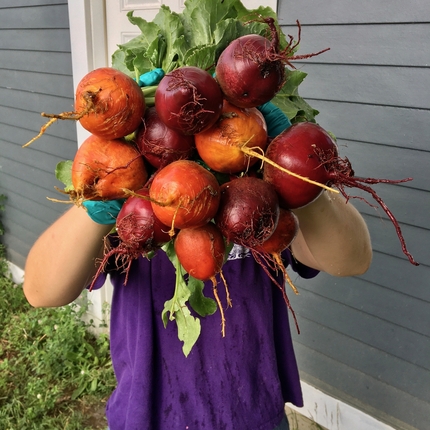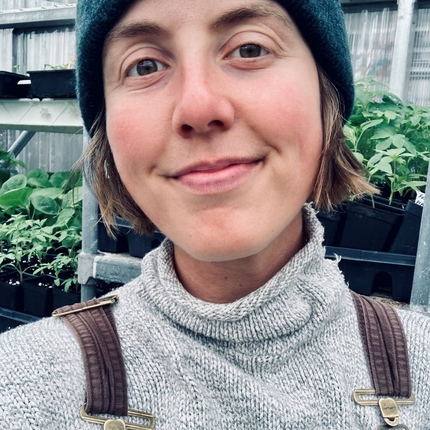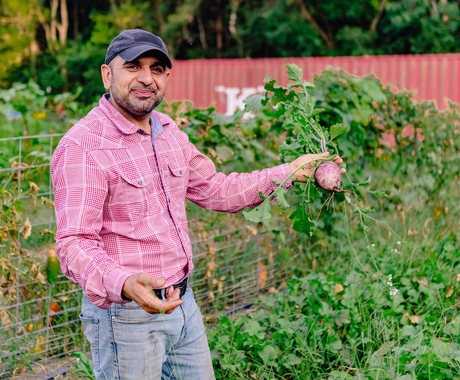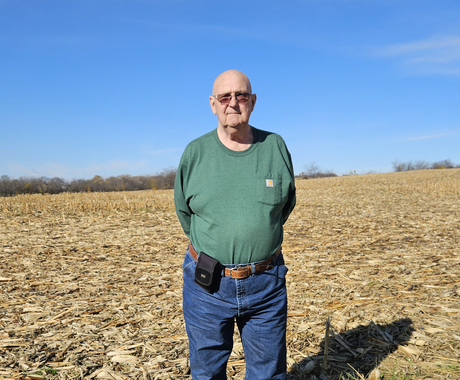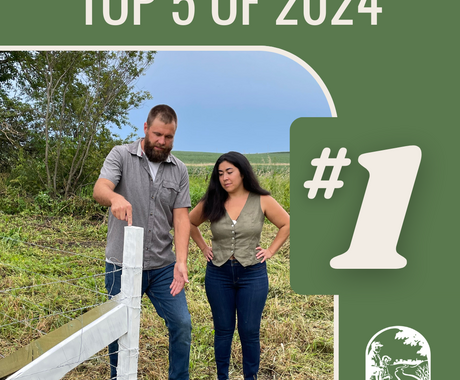An inquisitive mind is the first step to learning something new. For Katie Bettin, that curiosity has guided her throughout her pursuit of urban farming. With the knowledge she’s acquired, she hopes to one day see a solid foundation built for local food production and systems.
Her desire to contribute to that process started in 2018. Since then, Katie has explored and practiced farming, first at an internship for a small nonprofit farm and educational resource in Colorado, and now in Omaha, Nebraska, where she lives.
Katie applied to the 2022 Center for Rural Affairs Beginning Farmer Conservation Fellowship Program and was chosen to participate.
The Center started the program for beginning farmers and ranchers looking for guidance in implementing conservation programs. The fellows complete coursework in conservation programs and practices, climate change adaptation and impacts, racial equity, and leadership.
Conservation fellows will also design and implement a conservation project on their own farm or land they are farming and present their findings at a farm tour or at the annual Nebraska Sustainable Agriculture Conference in February.
“Conservation is a top priority because I see care and consideration for natural resources as a personal responsibility,” she said. “It changes the perspective when I consider how what I am doing will affect the neighbors around me, the city I live in, and so on.”
Katie says there are important conversations going on about how humans and other populations will continue to survive on this planet.
“Food production and systems are deeply intertwined,” she said, “meaning growers, laborers, maintainers, and stewards have to contemplate how we interact in the spaces we work.”
In an effort to contribute to healthier land and a healthier future, Katie implements conservation practices wherever she’s farming or tending plots of land. She has built raised garden beds and bolsters their soil at the end of each season with compost and wood chips. The height and layering of garden beds increases organic matter and allows for extended root depth and water retention.
Most of the city lots that Katie farms do not have stable water sources. In some cases, the farmers are tapping into water from neighboring houses, with consent.
“Watering is a whole pre-process, setup, and time-consuming task,” Katie said. “We use sprinklers that require attention. Drip line is something we are pursuing, but even then some of the shapes of our gardens and garden beds are unconventional and do not allow for drip tape. We want to understand other ways to harness natural and minimal water usage.”
Katie hopes being part of the Center’s program offers her the opportunity to gain knowledge, insights, and relationships that will foster a continuing growth in her ability to practice and expand on conservation methods.
“I appreciate mentorship and close relationships where there are similar interests and values,” she said. “I want to be a part of working spaces that allow open conversation, questioning, experimenting, and mutual motivation and inspiration.”
The fellow is also interested in understanding more about what conservation means in terms of finding feasible ways to be impactful in an urban setting.
“When I started growing food, I had a mindset of ‘I need and want to know it all,’” Katie said. “I’ve loosened my grip on that approach but still recognize how much information, practice, and perspective there is to open up to. Programs like the Center’s can help support folks through all of that.”
Katie believes the fellowship will help her make informed decisions as she farms with a changing climate in mind. In the future, she hopes to have her own land, where she can nourish the earth as well as those around her.
“I want my farming practices and experiences to allow for adaptability in the field and in farm planning, as well as where I could best fit into my local food system or where I could help guide it,” she said. “I hope to grow with others who are also dedicated to building and supplying a local food system that can sustain community needs.”
We are accepting mentor applications for our Beginning Farmer Conservation Fellowship Program, learn more at cfra.org/beginning-farmer-conservation-fellowship-program.
Photos submitted by: Katie Bettin

